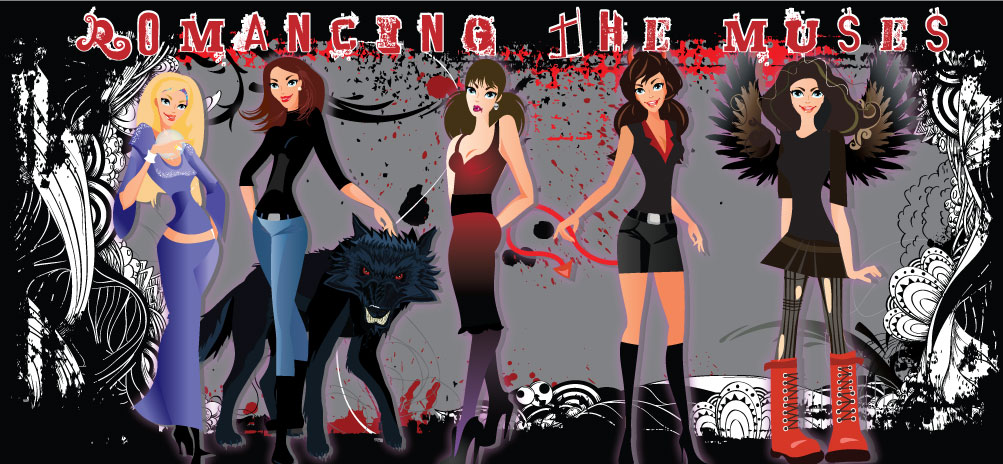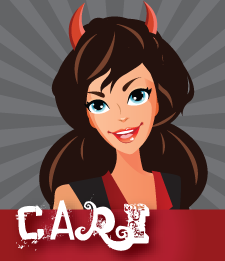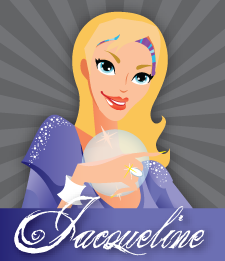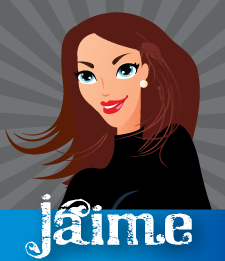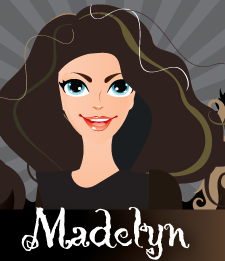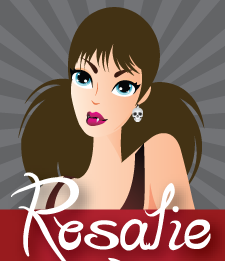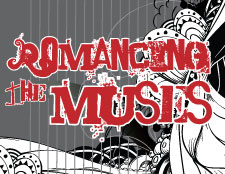If you've ever attended a Weight Watcher meeting or any such support group, you're probably familiar with pearls of fortune cookie wisdom. Aside from "Quitters Never Win and Winners Never Quit" -- which is a favorite of mine -- I was often told, "If you always do what you've always done, you'll always get what you've always got."
These adages might be old, but that doesn't make them wrong.
It's very easy to get discouraged in this business. No matter how well you write, there's someone else who's at a place you want to be and can't get in, or someone who doesn't write as well whose Amazon's rankings tower over yours. You can spend time you don't have and raise hopes you can't afford to raise only to fall flat on your face.
But the old adage is right. Quitters never win, and if you're determined to meet a certain goal, no matter the obstacles that pile in your way, there's nothing preventing you from ultimately reaching it. Don't let the rejections, bad reviews, negative feedback, and so on halt your journey. Most authors have a working understanding of what they do well and what they need to work on. Find yourself a crit partner who excels at something with which you need help. Target your weaknesses and don't blanch when people give you honest feedback. It might smart at first, but learning where you need work and focusing on perfecting your craft will always pay off.
Monday, February 27, 2012
Monday, February 20, 2012
You're Gonna Carry That Weight
Going viral.
The good, the bad, and the ugly.
The good? The act of being or having gone viral is relatively short-lived. People have incredibly tiny attention spans. If an author loses his or her composure over a negative review, a backlash can be expected, but it has an expiration date. A few months pass, and while your name might remain at least fleetingly familiar, it would take a trip to Google for a reminder. Granted, that might not exactly be reassuring, but soon people will be talking about something else.
The bad? Yes, for a while, if you have amounted bad publicity, you will be the topic of gossip and e-water cooler chatter. There will be people who remember you, and not fondly.
The ugly? Some of those people who remember you are those you don’t want remembering you.
Reputations are incredibly fragile things. Repairing any amount of damage, if at all possible, isn’t easy. Ask Robert Downey Junior if you think otherwise.
Ultimately, the reputation you have can and will shape your relationship with publishers. If you’re a difficult author to work with, word can well spread between houses. Where the important things are concerned, the Internet doesn’t forget. The relationships you forge, the people you encounter, the readers you inadvertently piss off, the tweet you shouldn’t have tweeted, the comment you made in a fit of anger on a blog…these things can all come back to haunt you.
The shield of a computer monitor can provide the illusion that professionalism isn’t an essential. We have to be mindful of ourselves as public figures, even if we’re not traditional public figures. Our business is with our readers, and readers who don’t respect the author are not likely to provide their patronage.
The good, the bad, and the ugly.
The good? The act of being or having gone viral is relatively short-lived. People have incredibly tiny attention spans. If an author loses his or her composure over a negative review, a backlash can be expected, but it has an expiration date. A few months pass, and while your name might remain at least fleetingly familiar, it would take a trip to Google for a reminder. Granted, that might not exactly be reassuring, but soon people will be talking about something else.
The bad? Yes, for a while, if you have amounted bad publicity, you will be the topic of gossip and e-water cooler chatter. There will be people who remember you, and not fondly.
The ugly? Some of those people who remember you are those you don’t want remembering you.
Reputations are incredibly fragile things. Repairing any amount of damage, if at all possible, isn’t easy. Ask Robert Downey Junior if you think otherwise.
Ultimately, the reputation you have can and will shape your relationship with publishers. If you’re a difficult author to work with, word can well spread between houses. Where the important things are concerned, the Internet doesn’t forget. The relationships you forge, the people you encounter, the readers you inadvertently piss off, the tweet you shouldn’t have tweeted, the comment you made in a fit of anger on a blog…these things can all come back to haunt you.
The shield of a computer monitor can provide the illusion that professionalism isn’t an essential. We have to be mindful of ourselves as public figures, even if we’re not traditional public figures. Our business is with our readers, and readers who don’t respect the author are not likely to provide their patronage.
Tuesday, February 14, 2012
Guest Author Charlene A Wilson
Today we have Author Charlene A Wilson here at RtM.
I asked my favorite question ...
I asked my favorite question ...
What is the hardest part of being an author for you?
When I read the question, I sat and thought about all the editing I’m going through right now with my Aumelan series. Cut the unnecessary adjectives, avoid adverblys (yeah, my own word there to remind me to hate the “ly” words), check for run-on sentences, axe the dialogue tags… You know the drill.
Not to mention the final edits I went through with the first two books of the Chronicles of Shilo Manor series—insert commas, add “and”s to the “then”s… Thank goodness I’m past that as Cornerstone Deep is published and Cornerstone Deep Echoes will be released tomorrow; both a mile stone and an awe striking moment for me. Are they really the best they could be? Will I ever really know? Sometimes I wonder if my work will ever be good enough. But, I did my best, look forward to the next, and am getting better with each.
Then, I realized something. The question wasn’t what I thought the hardest thing about being a writer was. It’s, “What is the hardest part of being an author for you?” That made me think.
I always thought of writer and author as being synonymous, though people seemed to select one or the other with purpose when then they talked about the craft. So, thanks to Romancing the Muses, I decided to look into it and find out, once and for all, what the difference between being an author and being a writer really is.
Now, of course, authors write. And, of course, writers can author. But, according to DifferenceBetween.net, “A writer is a person who writes a book, article, or any literary piece, while an author is essentially the person who originates the idea, plot, or content of the work being written. If you are writing a novel or short story based on a plot developed by self, you get to be known as the author of the novel. And if you are penning down someone else’s ideas or stories, you will be known as the writer of the work. Being a writer is at times easier than being an author. The reason being that an author has to create, develop, and communicate an idea, while a writer has to only communicate somebody else’s idea.”
“When it comes to writing books, a person becomes an author only when the book is published. If your work is unpublished, and even if the idea is purely your own, you will still be considered as the person who wrote the work. And when your work is published you get to be known as the author of the work. So if you write a lot, but never get them published and out to the public, you remain a writer.”
Okay. That didn’t totally make sense to me since a script-writer writes scripts and is known as a writer and not an author even though it’s published. But they also say…
Isn’t that wonderful? I finally got an answer to a question I never really gave much thought to. And the answer to how I should be answering my question, “How do I answer Romancing the Muses’ question?”…. Right, so I found out that what I considered the hardest thing about doing what I’m doing isn’t the hardest thing about what I am. But, we’ll go from here… (If you’re not totally confused by my line of thought by now, don’t worry. I’m confused enough for all of us. *wink*)
Being the creator of my stories, I’m calling myself the author of them. And in the creation process, I guess I would have to say the hardest thing would be making sure it all lines up. Stories can flow and practically write themselves when my characters and I are in sync. I’m one of those authors whose characters talk to them. They let me know what they should be doing in their lives.
But, getting it all properly laid out and flowing freely to where it makes sense to the reader can be difficult. We have to make sure the timeline fits—Let’s say I’m writing chapter fourteen. I have General Hilton in Sun City coming unglued and blowing up at Chad for endangering the population by introducing his people’s energy vampirish ways. But, in chapter fifteen, Chad is still in the World Beneath the Rock trying to convince the Leading Fathers of Aumelan to trust the people of the Sun with their secret. He hasn’t traveled to the World Above yet. Not good.
I double, triple, quadruple checked to make sure characters stay in character. I’d hate to have Mianna, a daughter of an Arylin colony and avid follower of the Goddess of Love, scoff at someone worshiping their God. Or, timid Mandy take on her reincarnated twin’s characteristic, who’s far beyond any five year old, of explaining the spiritual progression a soul.
There is so much that goes into the process of crafting a book. So much more than I ever dreamed of before I decided to take on this career. Would I trade it for anything else? Not a chance. Whether you call me a writer or an author, I’m here to stay. The Chronicles of Shilo Manor will keep growing…Cornerstone Deep Destiny is in the creation process now. Aumelan will hopefully be ready to submit later this year. Here’s to new worlds, hard work, and loving it.
Monday, February 13, 2012
Learn To Live With What You Are
Nearly fifteen years ago, I knew a woman who managed an online fanfic archive for stories devoted to the notorious creation of Thomas Harris. If that name is not instantly recognizable, try this one on for size: Hannibal Lecter.
That’s right, ladies and germs. Arguably fiction’s most renowned cannibal has—or rather, had—a modest fanbase. Heck, parts of those forums might still exist. I don’t know, I don’t check. The woman who ran this particular archive (we’ll call her Clarice just for grins) saw roughly the same appeal in Hannibal the Cannibal as others see in Erik from Phantom of the Opera. The grotesque, the tragic, the star-crossed…and for those of you who have read Thomas Harris’ work, that interpretation is not off base.
What struck me then about this woman was she was very grounded, and she didn’t shy from handing out business cards with her name and fandom association. To some of us, the things we do alone with the glow of a computer monitor is a very private affair…even if we’re not looking at porn or doing anything other than write a scene between our two title characters.
I remember once being very embarrassed showing anyone anything I’d written. Anything. Even an innocuous scene between friends. Therefore, the idea that someone would not only confess to their pastime, but advertise it to strangers was beyond me. Even now, though I have grown bolder and less discerning who knows my dirty little secret, I find it hard to believe I’d do the same given Clarice’s circumstances. Heck, when pushed, I’ll confess to writing “paranormal romance”—despite my vocal assertions that erotic romance writers ought not be ashamed.
Yet more than the labels that come with our craft is the mindset of where we are versus where we need to be. I highly doubt Clarice still hosts that website. It’s likely lost to the Ghost of Internet Past. Regardless, it was a stepping-stone. A place marking where she was in her writing career to where she went. In my case, I got my start in Internet publication in the same vein as so many others: in fan-fiction. I was ashamed to admit it until I stopped writing it, but I’m not ashamed anymore. Regardless of what it means to me now, it meant something to me then. I knew I wasn’t going to do it forever, but when I was at my happiest, I don’t think it would have bothered me. You go from that to the world of actual publishing—with its actual deadlines, actual editors, actual royalty statements, and actual panic attacks—and a lot of what you hear isn’t where you are, rather where you’re not. You’re not agented. You’re not a NYT Best Seller. You’re not making what you want to make. You’re not, you’re not, you’re not.
I think we get lost in the are not’s, and some of us have forgotten to learn to live with what we are, and how what we are builds into what we become. There is no race on this thing. If you love it, you stick with it. If you don’t love it, ask yourself why you do it. Is it for who you are or who you want to be, and if it’s the latter, are you satisfied being what you are, knowing it’s a necessary step to getting you where you want to go?
That’s right, ladies and germs. Arguably fiction’s most renowned cannibal has—or rather, had—a modest fanbase. Heck, parts of those forums might still exist. I don’t know, I don’t check. The woman who ran this particular archive (we’ll call her Clarice just for grins) saw roughly the same appeal in Hannibal the Cannibal as others see in Erik from Phantom of the Opera. The grotesque, the tragic, the star-crossed…and for those of you who have read Thomas Harris’ work, that interpretation is not off base.
What struck me then about this woman was she was very grounded, and she didn’t shy from handing out business cards with her name and fandom association. To some of us, the things we do alone with the glow of a computer monitor is a very private affair…even if we’re not looking at porn or doing anything other than write a scene between our two title characters.
I remember once being very embarrassed showing anyone anything I’d written. Anything. Even an innocuous scene between friends. Therefore, the idea that someone would not only confess to their pastime, but advertise it to strangers was beyond me. Even now, though I have grown bolder and less discerning who knows my dirty little secret, I find it hard to believe I’d do the same given Clarice’s circumstances. Heck, when pushed, I’ll confess to writing “paranormal romance”—despite my vocal assertions that erotic romance writers ought not be ashamed.
Yet more than the labels that come with our craft is the mindset of where we are versus where we need to be. I highly doubt Clarice still hosts that website. It’s likely lost to the Ghost of Internet Past. Regardless, it was a stepping-stone. A place marking where she was in her writing career to where she went. In my case, I got my start in Internet publication in the same vein as so many others: in fan-fiction. I was ashamed to admit it until I stopped writing it, but I’m not ashamed anymore. Regardless of what it means to me now, it meant something to me then. I knew I wasn’t going to do it forever, but when I was at my happiest, I don’t think it would have bothered me. You go from that to the world of actual publishing—with its actual deadlines, actual editors, actual royalty statements, and actual panic attacks—and a lot of what you hear isn’t where you are, rather where you’re not. You’re not agented. You’re not a NYT Best Seller. You’re not making what you want to make. You’re not, you’re not, you’re not.
I think we get lost in the are not’s, and some of us have forgotten to learn to live with what we are, and how what we are builds into what we become. There is no race on this thing. If you love it, you stick with it. If you don’t love it, ask yourself why you do it. Is it for who you are or who you want to be, and if it’s the latter, are you satisfied being what you are, knowing it’s a necessary step to getting you where you want to go?
Monday, February 6, 2012
"Et tu, Brute?"
As writers, we focus on making the intangible tangible. We strive to describe things that have never really been successfully described—emotions with definitions completely subjective to the individual emoting them, yet still somehow universal. To some, love might mean “never having to say you’re sorry.” Someone like me would amend that to something like, “love means saying you’re sorry when you mean it and not giving a damn what it does to your pride.”
As an editor, I see manuscripts from authors who have a killer story that falls completely flat due to lack of character. It’s the difference between the original Star Wars trilogy and the travesty that was the prequel films. Unlike the first films, many viewers didn’t care for the characters because they weren't complex or well-written. If they cared at all, it was because they were instructed to.
RedLetterMedia released three crushing multi-part vlog reviews of the prequel films that completely dismantled the protest of any apologist. One of the ways RLM demonstrated the inferiority not only as a part of a once golden franchise, but a movie at all, was asking fans to describe a character by their personality rather than appearance. For Luke Skywalker, Han Solo, and Leia Organa, this was a piece of cake. For Anakin Skywalker, Qui Gon Jinn, or any of the other prequel characters, it was near impossible…without putting some thought into it.
I’ve heard people complain about the acting in the prequel films, and in so, casting the script as a secondary problem. Liam Neeson a bad actor? Natalie Portman? Ewan McGregor? Hayden Christianson has been remarkable in some roles. Perhaps he wasn’t the best fit, but an actor is only as good as his script. Natalie Portman is a phenomenal actor, and anyone who thinks otherwise should go check out Black Swan.
It’s all in the writing.
The key element of the prequel films is betrayal. At the end, Obi Wan is screaming at a dying Anakin, telling the audience how he feels rather than showing it. And because he feels this way, we should as well. In the next scene, though, he’s just fine. Betrayal is something you can’t shake off, especially if it’s done at the hand of someone close to you. In my experience, it’s hollow and sad with little shocks of anger here and there, but really more just a blanket of nothing. It has left me uncomfortably numb—much more like Harrison Ford’s reaction at the killer’s identity in The Fugitive. If you’ve seen that movie, you know what I’m talking about.
No matter the genre—the fact that this particular example came from a science fantasy film notwithstanding—the power of story is the ability to make the most outrageous scenarios accessible to the audience. It doesn’t matter where the story is set or what it involves; a good writer will make it a human story. So look at your writing. Look at the language you use when describing love, sadness, loss, joy, excitement, betrayal, and so on. Ask your friends if they feel the intended emotion, or if they just know it’s there. Knowing and mastering the difference will only strengthen you as an author.
As an editor, I see manuscripts from authors who have a killer story that falls completely flat due to lack of character. It’s the difference between the original Star Wars trilogy and the travesty that was the prequel films. Unlike the first films, many viewers didn’t care for the characters because they weren't complex or well-written. If they cared at all, it was because they were instructed to.
RedLetterMedia released three crushing multi-part vlog reviews of the prequel films that completely dismantled the protest of any apologist. One of the ways RLM demonstrated the inferiority not only as a part of a once golden franchise, but a movie at all, was asking fans to describe a character by their personality rather than appearance. For Luke Skywalker, Han Solo, and Leia Organa, this was a piece of cake. For Anakin Skywalker, Qui Gon Jinn, or any of the other prequel characters, it was near impossible…without putting some thought into it.
I’ve heard people complain about the acting in the prequel films, and in so, casting the script as a secondary problem. Liam Neeson a bad actor? Natalie Portman? Ewan McGregor? Hayden Christianson has been remarkable in some roles. Perhaps he wasn’t the best fit, but an actor is only as good as his script. Natalie Portman is a phenomenal actor, and anyone who thinks otherwise should go check out Black Swan.
It’s all in the writing.
The key element of the prequel films is betrayal. At the end, Obi Wan is screaming at a dying Anakin, telling the audience how he feels rather than showing it. And because he feels this way, we should as well. In the next scene, though, he’s just fine. Betrayal is something you can’t shake off, especially if it’s done at the hand of someone close to you. In my experience, it’s hollow and sad with little shocks of anger here and there, but really more just a blanket of nothing. It has left me uncomfortably numb—much more like Harrison Ford’s reaction at the killer’s identity in The Fugitive. If you’ve seen that movie, you know what I’m talking about.
No matter the genre—the fact that this particular example came from a science fantasy film notwithstanding—the power of story is the ability to make the most outrageous scenarios accessible to the audience. It doesn’t matter where the story is set or what it involves; a good writer will make it a human story. So look at your writing. Look at the language you use when describing love, sadness, loss, joy, excitement, betrayal, and so on. Ask your friends if they feel the intended emotion, or if they just know it’s there. Knowing and mastering the difference will only strengthen you as an author.
Subscribe to:
Comments (Atom)
